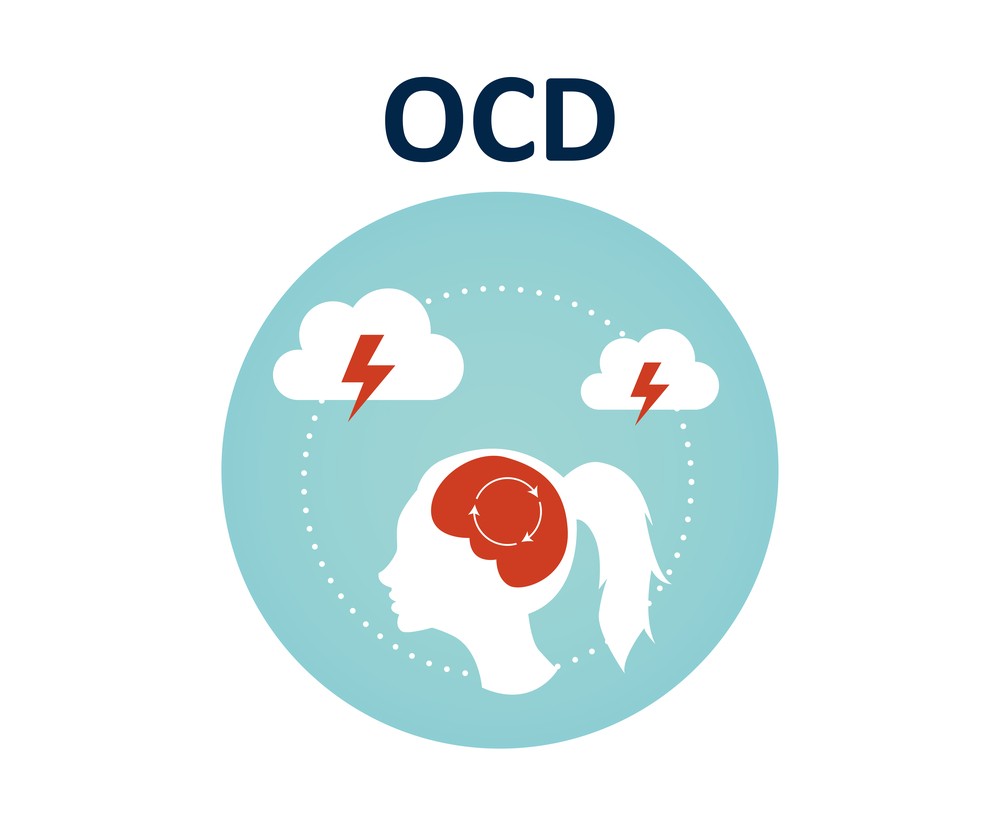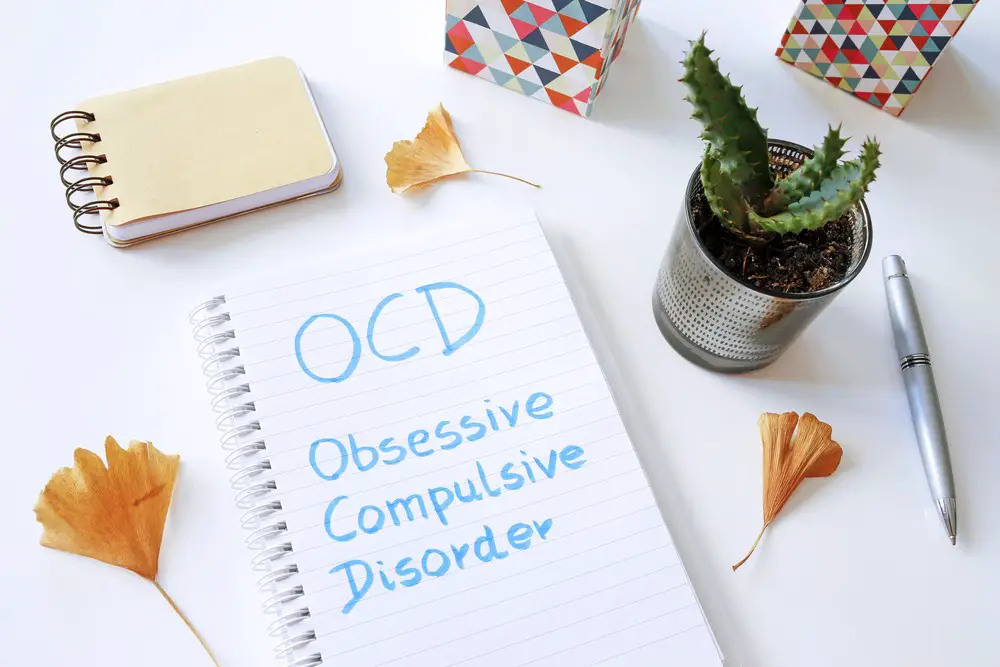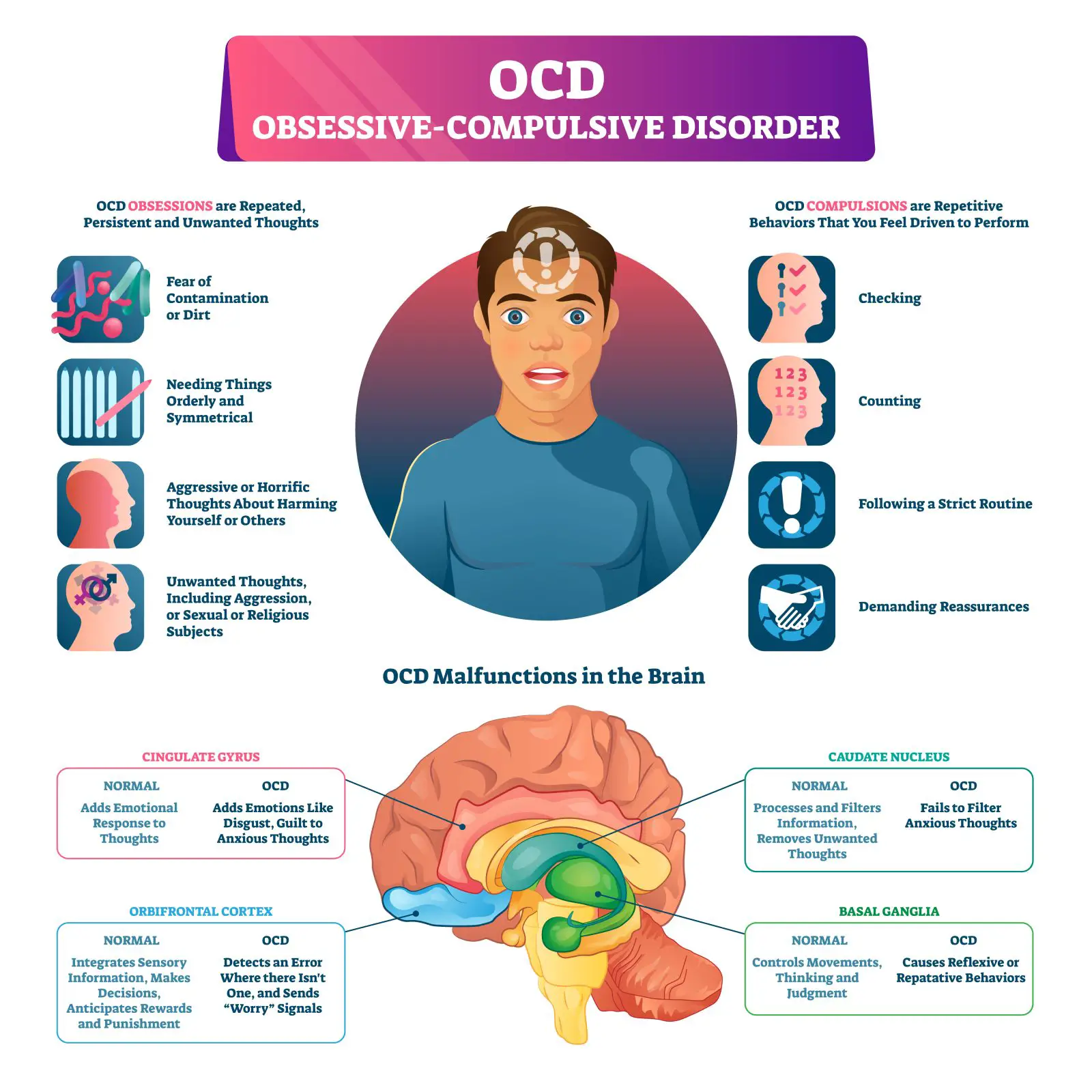As a BetterHelp affiliate, we receive compensation from BetterHelp if you purchase products or services through the links provided
Obsessive-compulsive disorder (OCD) is a mental health condition characterized by persistent, unwanted thoughts (obsessions) and repetitive behaviors (compulsions) that cause significant distress and interfere with daily life. It is a long-lasting disorder with symptoms ranging from mild to disabling. In some cases, the impact of OCD on an individual’s life and ability to work leads to whether it should be considered a disability.
When discussing the classification of OCD as a disability, it’s important to consider not only the symptoms and severity of the disorder but also its impact on a person’s ability to work and function in society. The legal definition of a disability, the rights and accommodations available to individuals with disabilities, and the potential benefits associated with disability status are all relevant factors in this discussion.
Key Takeaways
- OCD is a mental health disorder characterized by obsessions and compulsions that can interfere with daily life.
- The classification of OCD as a disability depends on its symptoms, severity, and impact on the individual’s ability to work and function in society.
- Legal definitions, rights, accommodations, and potential benefits should be considered in determining the disability status of someone with OCD.
 Understanding Obsessive-Compulsive Disorder
Understanding Obsessive-Compulsive Disorder
Obsessive-compulsive disorder (OCD) is a mental health condition that affects people of all ages. It’s characterized by recurring, unwanted thoughts (obsessions) and repetitive behaviors (compulsions). These symptoms can interfere with your daily life and cause significant distress.
To better understand OCD, it’s essential to grasp the two main components: obsessions and compulsions. Obsessions are often categorized as intrusive thoughts that consume your mind and create anxiety. Common examples include:
- Fear of germs or contamination
- Unwanted or inappropriate thoughts about sex, religion, or harm
- An extreme need for symmetry or orderliness
Conversely, compulsions are ritualistic behaviors you feel driven to perform in response to these obsessions. These may seem harmless rituals initially but can quickly become time-consuming and disabling. Some typical compulsive behaviors include:
- Excessive hand-washing or cleaning
- Constantly checking things, such as locks or appliances
- Repeatedly counting, tapping, or touching objects
The symptoms of OCD vary considerably and can often be difficult to manage. But don’t worry! Various effective treatments are available, including cognitive-behavioral therapy (CBT) and medication. Both approaches aim to help you gain control over your obsessions and compulsions, improving your overall quality of life.
Remember, having occasional intrusive thoughts or performing particular routines is normal. However, when these behaviors consume your daily life and impact your well-being, it might be time to seek professional help. Contact a mental health professional to discuss your concerns and explore the most appropriate treatment options.

Is OCD Considered a Disability?
In certain cases, Obsessive-compulsive disorder (OCD) can be considered a disability. The Centers for Disease Control and Prevention (CDC) defines a disability as any condition of the body or mind that makes it more difficult for the person to do certain activities and interact with the world around them.
If your OCD significantly impacts your ability to function in daily life or work, it can be deemed a disability. The Social Security Administration (SSA) lists OCD as a disability that can qualify you for disability benefits, depending on the severity of your condition.
Regarding the Americans with Disabilities Act (ADA), OCD can be protected if it substantially limits one or more major life activities, such as self-care, learning, working, or maintaining relationships. This means that your rights are protected under the ADA, and employers are required to provide reasonable accommodations for you in the workplace.
If you believe your OCD is disabling, you might consider filing a disability claim. To support your claim, you should:
- Obtain a formal diagnosis and ongoing treatment from a licensed mental health professional
- Keep thorough records of your symptoms, treatments, and their effects on your daily functioning
- Gather written statements from family members, friends, or coworkers who can attest to the impact of your OCD on your life.
It’s essential to remember that not all cases of OCD are severe enough to be considered a disability. But if your condition affects your life and work, it’s worth exploring options and seeking professional help.
In summary, OCD can be considered a disability depending on its severity and impact on your daily functioning. It’s essential to seek treatment, document the effects of your condition, and be aware of your rights under the ADA and the disability claim process.

Symptoms and Severity of OCD
Obsessive-compulsive disorder (OCD) can manifest in various ways, with symptoms ranging from mild to severe. Let’s dive into some of the elements that define this condition.
Obsessions are unwanted thoughts, mental images or urges intruding on a person’s daily life. These can cause significant anxiety and distress. Common obsessions include fear of germs or contamination, fear of forgetting, losing, or misplacing something. You might constantly think about these fears, even when you don’t want to.
Compulsions refer to repetitive behaviors or mental actions that someone feels compelled to perform in response to their obsessions. These actions are often aimed at reducing the distress triggered by obsessions. Examples of compulsions include excessive handwashing, checking locks and appliances repeatedly, or arranging items in a specific order.
The severity of your OCD depends on the intensity and frequency of the symptoms you experience. Sometimes, the symptoms might be mild and not entirely disrupt your daily life. However, for others, severe OCD symptoms can cause significant impairment and make it difficult to maintain a routine.
Here are some factors to consider when assessing the severity of OCD:
- Time-consuming symptoms: If your obsessions and compulsions take up a significant portion of your day, it’s a sign that your OCD is more severe.
- Distress: The level of emotional distress your symptoms cause can also indicate the severity of your condition. If your obsessions and compulsions lead to overwhelming stress, seeking help is important.
- Interference with daily life: Consider how your symptoms affect your day-to-day functioning. Severe OCD can impact your work, relationships, and overall well-being.
Dealing with OCD can be challenging, but understanding your symptoms and their severity is an important first step towards managing the condition. Being aware of your obsessions and compulsions, as well as the impact they have on your daily life, can help inform your treatment plan and guide your path to recovery.
 OCD and Its Impact on Ability to Work
OCD and Its Impact on Ability to Work
Living with Obsessive-Compulsive Disorder (OCD) can be incredibly challenging, especially when maintaining a job and performing daily tasks. Understanding how this mental health disorder may impact your ability to work and make accommodations if necessary is essential.
One of the primary ways OCD can affect your ability to work is through the time-consuming nature of obsessions and compulsions. These thoughts and rituals can significantly affect productivity, causing workday delays and disruptions. You might find yourself unable to concentrate and complete tasks on time due to the constant presence of intrusive thoughts.
Additionally, OCD can exacerbate stress levels in the workplace. High anxiety levels might lead to difficulties in decision-making, communication, and collaboration with coworkers. This can also result in a negative work environment and strained professional relationships.
Sometimes, OCD symptoms may force you to take time off work. Appointments with therapists, psychiatrists, or other mental health professionals are vital to managing the condition effectively. Sometimes, taking sick leave or requesting flexible working hours may be necessary to accommodate your mental health needs better.
Depending on the severity of your OCD, your symptoms might qualify as a disability. In such cases, you may be eligible for reasonable accommodations from your employer or benefits from your government. Gathering documentation from your healthcare providers and connecting with relevant agencies is important to access these resources.
Remember, managing OCD in the workplace is a challenge that many people face. By seeking support, understanding your limits, and advocating for your needs, you can create a more sustainable work environment for yourself.

OCD and the ADA: Workplace Accommodations
Understanding ADA
The Americans with Disabilities Act (ADA) is a federal law that aims to protect individuals with disabilities from discrimination in various areas, including the workplace. Under the ADA, Obsessive-Compulsive Disorder (OCD) is considered a disability, as it can interfere with daily life and work.
As someone dealing with OCD, you might face challenges in the workplace, such as:
- Attendance and punctuality issues
- Meeting deadlines
- Staying organized
- Maintaining concentration
- Managing distractions
The ADA requires employers to provide reasonable accommodations to help you overcome these challenges and perform your job effectively. These accommodations are specific adjustments that allow you to carry out your work duties and minimize the impact of your OCD symptoms.
Here are some examples of accommodations that might be helpful for employees with OCD:
- Flexible schedules: If you struggle with punctuality or attending work on specific days, a flexible schedule could help you manage your work hours better.
- Organizational tools: Items like planners, calendars, and document organization software can help you stay organized and manage your tasks effectively.
- Frequent breaks: Short breaks throughout the workday can help you regain focus and manage any anxiety from your OCD.
- A quiet workstation: A workstation away from distractions and noise can help you maintain concentration.
To access workplace accommodations, you must communicate with your employer about your needs and how specific adjustments could enable you to perform your job duties. By keeping an open line of communication and working together with your employer, you can create a work environment that supports your well-being while allowing you to be a valuable contributor to the team. The key takeaway is that the ADA protects your rights as an employee with OCD, and by understanding your options, you can make informed decisions that ensure a productive and supportive work environment.
Social Security Disability Benefits for OCD
Eligibility Requirements
To be eligible for Social Security disability benefits based on OCD, your condition must be well documented and severely debilitating. The Social Security Administration (SSA) evaluates OCD as an anxiety-related disorder. To prove medical disability due to OCD, you must have a diagnosis characterized by either an involuntary, time-consuming preoccupation with intrusive, unwanted thoughts or by repetitive behaviors aimed at reducing anxiety.
Your OCD must significantly impact your ability to function in daily life or work to qualify for disability benefits. It’s important to check the SSA’s Blue Book, which contains the list of impairments that qualify for disability benefits, to understand if your OCD matches the required severity level.
Application Process
When you apply for disability benefits, gather necessary documentation, such as medical records, treatment history, and information about your daily functioning. Keep these tips in mind during the application process:
- Be thorough with your medical records: Ensure that you have complete documentation of your OCD, including your diagnosis, treatment history, and the impact it has on your daily life.
- Get support from professionals: Seek the help of your healthcare provider or a disability advocate to navigate the application process and provide relevant documentation.
- Prepare yourself for potential denials: Don’t be disheartened if your claim is denied initially. You have the right to appeal, and many claims are approved upon appeal.
So, when applying for Social Security disability benefits due to OCD, it’s essential to understand the eligibility requirements and be well-prepared for the application process. You can increase your chances of a successful claim with the right documentation and support.
OCD in Childhood and Learning
Obsessive-Compulsive Disorder (OCD) can impact children’s lives, especially in academic settings. In this section, we will discuss the challenges of OCD in childhood and learning environments, focusing on how it manifests in schools and classrooms.
OCD in Schools and Classrooms
Children with OCD may experience distressing thoughts, anxiety, and compulsive behaviors, affecting their learning. Some of the challenges they might face in school settings include:
- Distraction and daydreaming: Students with OCD can experience intrusive thoughts, which cause them to appear unfocused or disinterested.
- Difficulty concentrating: The anxiety and repetitive behaviors caused by OCD can make it hard for children to pay attention and absorb information in the classroom.
- Time management: Compulsions can take up a significant amount of time, making it difficult for students to complete tasks efficiently.
To help students with OCD succeed in school, educators must understand and accommodate their needs. Here are some strategies for managing their behavior in the classroom:
- Create a supportive environment: Encourage open communication between students, parents, and teachers. Ensure everyone is aware of the student’s OCD and collaborates to support them.
- Plan extra time for assignments: Students with OCD may need additional time to complete tasks due to compulsions or anxiety. Provide extended deadlines when appropriate.
- Reduce stressful situations: Identify triggers that exacerbate the student’s OCD and work to minimize them. For example, changing seating arrangements, modifying group projects, or offering alternative assessment methods.
- Offer regular check-ins: Schedule routine meetings with the student to discuss their progress and address any concerns they may have.
By implementing these strategies and fostering a supportive learning environment, you can help students with OCD overcome their challenges and thrive in their academic pursuits. Remember, approaching OCD in childhood with understanding and empathy can make all the difference in a student’s success.
 Living with OCD: Coping Mechanisms and Therapies
Living with OCD: Coping Mechanisms and Therapies
Living with obsessive-compulsive disorder (OCD) can be challenging, but various coping mechanisms and therapies can help you manage your anxiety and stress. This section will briefly discuss key strategies to address anxiety disorders and ease everyday life.
Therapy: Seeking help from a mental health professional is essential in managing the symptoms of OCD. One of the most effective treatment methods for OCD is Exposure and Response Prevention (ERP). ERP seeks to break the link between obsessive thoughts and compulsive behaviors by exposing you to triggers without acting upon them.
Relaxation Techniques: Techniques such as deep breathing, progressive muscle relaxation, and meditation can help alleviate anxiety and stress associated with OCD. Incorporating these practices into your daily routine will cultivate a greater sense of internal calm and resilience against intrusive thoughts and urges.
- Exercise: Regular physical activity is effective in managing the symptoms of anxiety disorders, including OCD. Exercise releases endorphins, natural mood-boosting chemicals that can help reduce the intensity of obsessive thoughts and compulsive behaviors.
- Medications: Some people may benefit from medications prescribed by a healthcare professional. Selective serotonin reuptake inhibitors (SSRIs) and other antidepressants are commonly used to help manage the symptoms of OCD, as they can ease feelings of anxiety and promote a more balanced mood.
- Support Systems: Forming healthy relationships with friends, family members, and support groups can be immensely helpful in your journey with OCD. Sharing your experience and learning from others can provide comfort, encouragement, and a sense of belonging in the face of adversity.
Remember, the key to successfully managing OCD lies in finding the right combination of coping mechanisms and therapies that resonate with you and your unique journey. With perseverance and support, you can gain better control over your OCD symptoms and lead a more fulfilling life.
 Mirror, Mirror on the Wall: Signs It’s Time for Therapy, Goals to Set, and How to Chart Your Progress
Mirror, Mirror on the Wall: Signs It’s Time for Therapy, Goals to Set, and How to Chart Your Progress
Navigating the maze of obsessive-compulsive disorder (OCD) can feel like an exhausting journey. You might be wondering if therapy is the next logical step. What should you aim to achieve through therapy, and how will you know if it’s working? Buckle up because we’re about to dig into this!
Signs You Might Need Therapy for OCD
Recognizing that you might need professional help is the first brave step toward managing OCD. Here are some red flags that hint it might be time to talk to a therapist:
- Your rituals rule you: You find it difficult to complete your daily routine without performing certain rituals, like excessive hand-washing or checking things.
- Feeling isolated: Your symptoms start to make you withdraw from friends, family, or activities you once enjoyed.
- Sky-high anxiety: Despite performing your rituals, the anxiety doesn’t dissipate; it’s only getting worse.
- Impact on Work: Your performance at work or school suffers because you’re preoccupied with obsessive thoughts or compulsive behaviors.
- Life on Pause: You are postponing or entirely avoiding life milestones because your OCD feels overwhelming.
Goals for Therapy
Therapy is not a one-size-fits-all affair. Different folks, different strokes! Here are some common goals you might consider:
- Symptom Management: Learn coping mechanisms to manage your triggers and symptoms.
- Self-Awareness: Develop an understanding of your thought patterns and how they influence your behavior.
- Functionality: Work toward a state where OCD has minimal impact on your daily activities and relationships.
- Empowerment: Become adept at identifying and questioning your obsessions and compulsions.
Monitoring Your Progress
Tracking your journey is essential. You can’t know where you’re going if you don’t know where you’ve been, right? Here are some ways to monitor progress:
- Progress Journal: Keep a daily or weekly record of your symptoms, triggers, and coping strategies.
- Feedback Loops: Regularly discuss your progress with your therapist to identify what’s working and needs tweaking.
- Goal Check-Ins: Periodically review your goals to ensure they’re still relevant. Change isn’t linear; it’s okay to adapt your objectives.
- Milestones: Celebrate small victories, whether a day without giving in to a compulsion or successfully managing a trigger.
Remember, therapy is not a quick fix but a journey of understanding yourself better and improving your quality of life. So if you’ve recognized some of these signs and considerations, maybe it’s time to seek help.
Conclusion
In understanding OCD as a disability, it’s crucial to consider its impact on your daily life. With various symptoms, including obsessions and compulsions, OCD can cause significant distress and anxiety, making everyday functioning challenging.
Living with OCD can affect various aspects of your life, from your relationships to your career. Recognizing how this disorder can limit your ability to perform the tasks you once enjoyed and adapt to living a fulfilling life despite these challenges is essential.
It’s important to remember that many highly functioning individuals also live with OCD. By incorporating coping strategies such as therapy, medication, and self-help tips into your lifestyle, you can learn to manage your symptoms and decrease the impact OCD has on your life.
In the end, whether or not you consider OCD a disability, it is evident that it can significantly affect your daily functioning. By educating yourself and seeking appropriate treatment, you can ease the burden of this disorder and embrace a life filled with hope and positivity. Remember, you are not alone; with the right support and understanding, you can overcome the challenges that OCD may bring.
Frequently Asked Questions

What type of disability is OCD?
Obsessive-Compulsive Disorder (OCD) is a mental health disorder that involves uncontrollable, recurring thoughts and behaviors. It is considered a psychiatric disability, affecting a person’s ability to function in daily life, social situations, and the workplace.
Can you get short-term disability for OCD?
Yes, it’s possible to receive short-term disability benefits for OCD. If your OCD symptoms are severe enough to impact your ability to work, you may be eligible for these benefits. To apply for short-term disability, you’ll need documentation from a mental health professional and should follow your employer’s specific guidelines or the insurance company’s procedures.
Are OCD benefits covered under disability?
OCD is considered a mental disability and can qualify for benefits under Social Security Disability Insurance (SSDI) or Supplemental Security Income (SSI) programs. To receive benefits, you must demonstrate that the severity of your symptoms prevents you from maintaining substantial gainful employment.
Is OCD considered a mental disability?
Yes, OCD is classified as a mental health disability. It is characterized by recurrent obsessions and compulsions that significantly affect a person’s daily life, social functioning, and/or work performance.
How can one prove disability due to OCD?
To prove disability due to OCD, you’ll need comprehensive documentation from mental health professionals who have diagnosed and treated your condition. These documents should detail the severity and duration of your symptoms and their impact on your daily life and functioning. Additionally, records of treatments, medications, and any other interventions should be included to support your claim.
Is OCD covered under the Disability Act?
OCD is covered under the Americans with Disabilities Act (ADA). Employees with OCD are protected from discrimination during the hiring process or while employed as long as their condition doesn’t significantly affect their ability to perform essential job functions. Employers must also provide reasonable accommodations to support employees with OCD based on individual needs and job requirements.
About Jacob Maslow
After surviving the traumatizing events of 9/11, I took it upon myself to heal through helping others. I’m the primary caregiver of my children and understand from first-hand experience the lonely paths you have to walk as a partner and parent when leaving an unhealthy relationship.
We’re all echoing in a dark space that doesn’t have to be this empty, and that’s been my mission since finding solace and recovery in therapy: To help comfort others who are still in shock and at the prime of their struggle.
I came across BetterHelp after searching for this type of community. I wanted to belong to a body of proactive therapists and supportive therapy veterans that allowed me to see other sides of the story.
It was unconventional, and that’s what attracted me most. During my most challenging times, when my ex-wife completely cut me off from my children, I found comfort and clarity through BetterHelp.
Instead of being chained to a strict therapist recommendation, I was in charge of who I felt understood my struggle most. That allowed me to find my true peace, as I was reunited with those who read behind my words and had first-hand experience with my trauma.
Recovery is a choice; with BetterHelp, that choice will be a few clicks away. You can join their couples-oriented platform, Regain.us for those stuck with family estrangement and toxic relationship patterns.
- 7 Ideas to Help You Relax and Unwind on a Family Vacation - April 27, 2025
- How Having Cybersecurity Protection Helps You Relax - April 25, 2025
- 8 Reasons Why Spending Time Outside Calms You Down - April 25, 2025
This site contains affiliate links to products. We will receive a commission for purchases made through these links.


 Understanding Obsessive-Compulsive Disorder
Understanding Obsessive-Compulsive Disorder OCD and Its Impact on Ability to Work
OCD and Its Impact on Ability to Work Living with OCD: Coping Mechanisms and Therapies
Living with OCD: Coping Mechanisms and Therapies Mirror, Mirror on the Wall: Signs It’s Time for Therapy, Goals to Set, and How to Chart Your Progress
Mirror, Mirror on the Wall: Signs It’s Time for Therapy, Goals to Set, and How to Chart Your Progress
